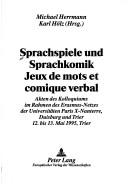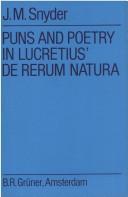| Listing 1 - 10 of 15 | << page >> |
Sort by
|
Book
ISBN: 1282872370 9786612872372 023152529X 0231151608 Year: 2010 Publisher: New York : Columbia University Press,
Abstract | Keywords | Export | Availability | Bookmark
 Loading...
Loading...Choose an application
- Reference Manager
- EndNote
- RefWorks (Direct export to RefWorks)
Beginning in the sixth century C.E. and continuing for more than a thousand years, an extraordinary poetic practice was the trademark of a major literary movement in South Asia. Authors invented a special language to depict both the apparent and hidden sides of disguised or dual characters, and then used it to narrate India's major epics, the Ramayana and the Mahabharata, simultaneously.Originally produced in Sanskrit, these dual narratives eventually worked their way into regional languages, especially Telugu and Tamil, and other artistic media, such as sculpture. Scholars have long dismissed simultaneous narration as a mere curiosity, if not a sign of cultural decline in medieval India. Yet Yigal Bronner's Extreme Poetry effectively negates this position, proving that, far from being a meaningless pastime, this intricate, "bitextual" technique both transcended and reinvented Sanskrit literary expression.The poems of simultaneous narration teased and estranged existing convention and showcased the interrelations between the tradition's foundational texts. By focusing on these achievements and their reverberations through time, Bronner rewrites the history of Sanskrit literature and its aesthetic goals. He also expands on contemporary theories of intertextuality, which have been largely confined to Western texts and practices.
Sanskrit poetry --- Puns and punning in literature. --- History and criticism.

ISBN: 363149162X Year: 1996 Publisher: Frankfurt am Main Lang
Abstract | Keywords | Export | Availability | Bookmark
 Loading...
Loading...Choose an application
- Reference Manager
- EndNote
- RefWorks (Direct export to RefWorks)
Book
ISBN: 9788855531085 Year: 2011 Publisher: Bologna Pàtron
Abstract | Keywords | Export | Availability | Bookmark
 Loading...
Loading...Choose an application
- Reference Manager
- EndNote
- RefWorks (Direct export to RefWorks)
Puns and punning in literature --- Apuleius --- Apuleius --- Language. --- Literary style.
Book
ISBN: 9004414169 Year: 2020 Publisher: Leiden Boston : Brill | Rodopi,
Abstract | Keywords | Export | Availability | Bookmark
 Loading...
Loading...Choose an application
- Reference Manager
- EndNote
- RefWorks (Direct export to RefWorks)
"Despite their apparent disparity, Apollinaire, Prévert, Tournier and Beckett share a predilection for ambiguity in general and for puns in particular. The literary function they confer to double meanings and puns is not limited to humour or entertainment. On the contrary, it often generates serious reflections and tragic plots. Moreover, intentional ambiguity and puns can be the basis for the genesis and structuring of their works. Malgré leur apparente disparité, Apollinaire, Prévert, Tournier et Beckett partagent leur prédilection pour l'ambiguïté en général et leur goût pour le jeu de mots en particulier. La fonctionnalité littéraire qu'ils confèrent aux doubles sens et au jeu de mots ne se limite pas à la plaisanterie ou au divertissement cérébral. Bien au contraire, elle est souvent à l'origine d'évocations sérieuses et d'implications tragiques. Qui plus est, l'ambiguïté intentionnelle et le jeu de mots peuvent être à la base de la genèse et de la structuration de leurs œuvres".
Ambiguity in literature. --- French literature --- Puns and punning in literature. --- History and criticism.

ISBN: 9060321243 9789060321249 Year: 1980 Publisher: Amsterdam Grüner
Abstract | Keywords | Export | Availability | Bookmark
 Loading...
Loading...Choose an application
- Reference Manager
- EndNote
- RefWorks (Direct export to RefWorks)
Didactic poetry, Latin --- Puns and punning in literature --- History and criticism --- Lucretius Carus, Titus --- -Puns and punning in literature --- Latin didactic poetry --- Latin poetry --- Lukrecjusz Karus, Tytus --- Lukret︠s︡iĭ Kar, Tit --- Lucrezio, Tito --- Lucrèce --- Lucrez --- Lucrecio Caro, T. --- Caro, T. Lucrecio --- Carus, Titus Lucretius --- Lucretius --- Lucrezio Caro, Tito --- Lucrecio --- Lucreti Cari, T. --- Lucreci --- לוקרציוס קרוס, טיטוס --- Puns and punning in literature. --- History and criticism. --- Lucretius Carus, Titus. --- Lucrèce --- Lukrez --- Didactic poetry, Latin - History and criticism --- Lucretius Carus, Titus - De rerum natura
Book
ISBN: 9789004352629 Year: 2018 Publisher: Leiden Brill
Abstract | Keywords | Export | Availability | Bookmark
 Loading...
Loading...Choose an application
- Reference Manager
- EndNote
- RefWorks (Direct export to RefWorks)
'Jeux de mots' celebrates the creative power of wordplay from Rabelais to present times. Puns, portmanteaus, bon mots, neologisms, fetish-words: this collective volume focuses on literary wordplay in very different fields such as literary onomastics and constrained writing, both in prose and in poetry. Specialists in the field show how, from Rabelais to Richard Millet through Roussel and Roubaud and from Mallarmé to Fargue through Apollinaire and nonsense verse, prose and poetry explore the productivity of words, their power of metamorphosis and their capacity to make meaning shift. The volume ends with a section on wordplay in philosophy and the cinema.
French literature --- Puns and punning in literature --- Plays on words --- Play of words --- Play on words --- Word play --- Wordplay --- History and criticism --- Semantics --- Wit and humor
Book
ISBN: 9004355456 9789004355453 9789004352629 9004352627 Year: 2018 Publisher: Leiden Boston
Abstract | Keywords | Export | Availability | Bookmark
 Loading...
Loading...Choose an application
- Reference Manager
- EndNote
- RefWorks (Direct export to RefWorks)
Jeux de mots célèbre le pouvoir créateur des jeux de langage dans la littérature de Rabelais à nos jours. Calembour, mot-valise, bon mot, néologisme, mot-fétiche : ce volume collectif s’attache au jeu de mots littéraire dans des domaines aussi variés que l’onomastique littéraire et l’écriture à contraintes, aussi bien dans la prose que dans la poésie. Les études de spécialistes ici réunies montrent comment, de Rabelais à Richard Millet en passant par Roussel et Roubaud et de Mallarmé à Fargue en passant par Apollinaire et le ‘nonsense verse’, la prose et la poésie explorent la productivité des mots, leur pouvoir de métamorphose et leur aptitude à faire infiniment glisser le sens. Le volume se termine par une ouverture sur le jeu de mots en philosophie et au cinéma. Jeux de mots celebrates the creative power of wordplay from Rabelais to present times. Puns, portmanteaus, ‘bon mots’, neologisms, fetish-words: this collective volume focuses on literary wordplay in very different fields such as literary onomastics and constrained writing, both in prose and in poetry. Specialists in the field show how, from Rabelais to Richard Millet through Roussel and Roubaud and from Mallarmé to Fargue through Apollinaire and ‘nonsense verse’, prose and poetry explore the productivity of words, their power of metamorphosis and their capacity to make meaning shift. The volume ends with a section on wordplay in philosophy and the cinema.
French literature --- Puns and punning in literature. --- Plays on words. --- Play of words --- Play on words --- Word play --- Wordplay --- Semantics --- Wit and humor --- History and criticism.
Book
ISBN: 303910554X Year: 2005 Publisher: Bern Lang
Abstract | Keywords | Export | Availability | Bookmark
 Loading...
Loading...Choose an application
- Reference Manager
- EndNote
- RefWorks (Direct export to RefWorks)
Puns and punning --- Puns and punning in literature. --- Mots d'esprit et jeux de mots --- Mots d'esprit et jeux de mots dans la littérature --- Woordspel --- Woordspelingen --- Woordspel. --- Woordspelingen. --- Mots d'esprit et jeux de mots dans la littérature --- Puns and punning in literature --- Punning --- Plays on words --- Homonyms --- Paronyms --- History and criticism
Book
ISBN: 9782848322216 2848322217 Year: 2015 Publisher: Arras : Artois presses université,
Abstract | Keywords | Export | Availability | Bookmark
 Loading...
Loading...Choose an application
- Reference Manager
- EndNote
- RefWorks (Direct export to RefWorks)
Les bons mots, les jeux de mots et les jeux sur les mots "sont de tous les temps, de tous les pays, de tous les types d'écrits et de discours. Ils sont présents sur la scène politique comme sur celle du théâtre, dans la publicité comme dans la grande littérature, au coeur des chansons comme dans le champ de la psychanalyse. Boutade, mot d'esprit, calembour, charade, mot-valise, rime, anagramme, contrepèterie, "antistrophe" en sont autant de déclinaisons, et la liste est loin d'être close. Comment fonctionnent-ils ? Peuvent-ils passer d'une culture à une autre, d'une langue à une autre ? Pourquoi joue-t-on ainsi avec les mots ? Pour faire rire ou pour séduire ? à dessein ou malgré soi ? Autant de questions qui intéressent de nombreux domaines - linguistique, stylistique, traductologie, psychanalyse - et qu'explorent les articles de ce recueil croisant les points de vue de divers spécialistes.
French wit and humor --- Plays on words --- Puns and punning --- Puns and punning in literature --- Play of words --- Play on words --- Word play --- Wordplay --- Punning --- Conferences - Meetings --- Jeux linguistiques --- Mots d'esprit et jeux de mots --- Histoire et critique --- French literature --- Semantics --- Wit and humor --- Homonyms --- Paronyms --- Jeux linguistiques. --- Histoire et critique. --- French wit and humor - Congresses --- Plays on words - France - Congresses --- Puns and punning - France - Congresses --- Puns and punning in literature - Congresses
Book
ISBN: 9780195341447 0195341449 0199712220 0199866910 Year: 2010 Publisher: Oxford : Oxford University Press,
Abstract | Keywords | Export | Availability | Bookmark
 Loading...
Loading...Choose an application
- Reference Manager
- EndNote
- RefWorks (Direct export to RefWorks)
Latin drama (Comedy) --- Plays on words. --- Puns and punning in literature. --- Greek influences. --- Plautus, Titus Maccius --- Language. --- Literary style. --- Puns and punning in literature --- Plays on words --- Latin drama --- Play of words --- Play on words --- Word play --- Wordplay --- Semantics --- Wit and humor --- Greek influences --- Plaute --- Plauto, Tito Maccio --- Language --- Literary style --- Plavt, Tit Makt︠s︡iĭ --- Plautus, M. Accius --- Plautus --- Plautus, M. Attius --- Plautus, Marcus Actius --- Plautus, Marcus Accius --- Plautus, Marcus Attius --- Plauto, Marco Accio --- Plautos, Titos Makkios --- פלאוטוס --- Latin drama (Comedy) - Greek influences --- Plautus, Titus Maccius - Language --- Plautus, Titus Maccius - Literary style
| Listing 1 - 10 of 15 | << page >> |
Sort by
|

 Search
Search Feedback
Feedback About UniCat
About UniCat  Help
Help News
News